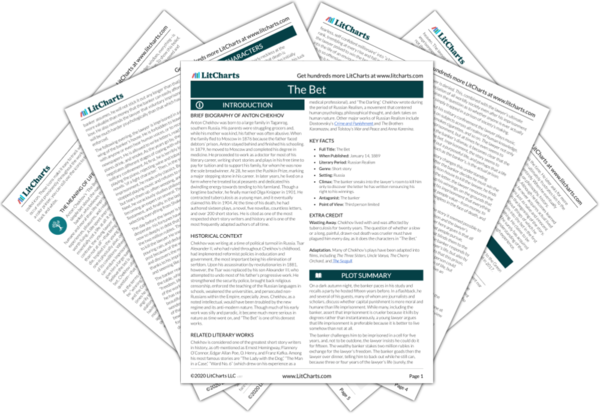The books that the lawyer reads symbolize his mental state and philosophical outlook, as his reading choices track his evolving views on the nature and value of human life. When he initially agrees to the bet, the lawyer is young and callow, and as such the first books he reads are “light,” selected to pass the time. He later asks for more substantial literature, which ultimately frustrates him to the point that he stops reading entirely. When he eventually returns to reading, he focuses on philosophy, history, languages, and, finally, the Bible. Although he becomes learned over his fifteen years in captivity, he never acquires actual lived experience, and in a way, he remains just as naïve and innocent of the ways of the world as he was in the beginning of the story, still willing to speak authoritatively about things of which he has no experience (which is what got him into the bet in the first place). In a way, then, he has learned nothing. He claims to be “cleverer than [them] all” by the end, and he surely has acquired wisdom, but the books represent a naïve understanding of the world that is devoid of wisdom gained through experience.
Books Quotes in The Bet
During the last two years of his confinement the prisoner read an extraordinary amount, quite haphazard. Now he would apply himself to the natural sciences, then he would read Byron or Shakespeare … He read as though he were swimming in the sea among broken pieces of wreckage, and in his desire to save his life was eagerly grasping one piece after another.

Unlock explanations and citation info for this and every other The Bet quote.
Plus so much more...
Get LitCharts A+“To-morrow at twelve o'clock midnight, I shall obtain my freedom and the right to mix with people. But… [o]n my own clear conscience and before God who sees me I declare to you that I despise freedom, life, health, and all that your books call the blessings of the world.”












